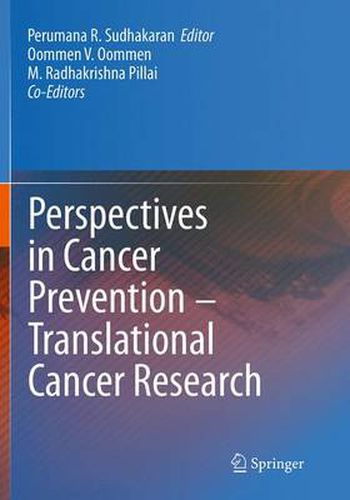Readings Newsletter
Become a Readings Member to make your shopping experience even easier.
Sign in or sign up for free!
You’re not far away from qualifying for FREE standard shipping within Australia
You’ve qualified for FREE standard shipping within Australia
The cart is loading…






This title is printed to order. This book may have been self-published. If so, we cannot guarantee the quality of the content. In the main most books will have gone through the editing process however some may not. We therefore suggest that you be aware of this before ordering this book. If in doubt check either the author or publisher’s details as we are unable to accept any returns unless they are faulty. Please contact us if you have any questions.
Being a complex disease that affects millions of people world over, cancer research has assumed great significance. Translational cancer research transforms scientific discoveries in the laboratory or population studies into clinical application to reduce incidence of cancer , morbidity and mortality. It is becoming increasingly evident that cancer is a preventable disease. The IVth International Symposium on Translational Cancer Research held in Udaipur, India in December 2011, discussed various aspects of the biological processes in cancer cells and approaches to cancer prevention. A few contributions from this meeting are presented in this book, providing an in depth analysis of data on cancer prevention and therapeutics. These contributions are either critical reviews or research reports. The topics discussed include evidence-based nutritional recommendations for cancer patients and survivors, risk factors such as stress, enrichment of tumour stem cells by anticancer drug treatment contributing to tumour recurrence and the mechanism of anticancer effects of various natural products. Chemosensitizing effect of curcumin, anti-cancer effect of products from neem, action of sulforaphane and cytotoxic effect of a number of novel synthetic coordination complexes of trace metals have been discussed. Novel molecular targets of angiogenesis and molecular basis of the gender bias to thyroid cancer have also been discussed . This book provides useful information on translational cancer research to clinicians and biomedical scientists.
$9.00 standard shipping within Australia
FREE standard shipping within Australia for orders over $100.00
Express & International shipping calculated at checkout
This title is printed to order. This book may have been self-published. If so, we cannot guarantee the quality of the content. In the main most books will have gone through the editing process however some may not. We therefore suggest that you be aware of this before ordering this book. If in doubt check either the author or publisher’s details as we are unable to accept any returns unless they are faulty. Please contact us if you have any questions.
Being a complex disease that affects millions of people world over, cancer research has assumed great significance. Translational cancer research transforms scientific discoveries in the laboratory or population studies into clinical application to reduce incidence of cancer , morbidity and mortality. It is becoming increasingly evident that cancer is a preventable disease. The IVth International Symposium on Translational Cancer Research held in Udaipur, India in December 2011, discussed various aspects of the biological processes in cancer cells and approaches to cancer prevention. A few contributions from this meeting are presented in this book, providing an in depth analysis of data on cancer prevention and therapeutics. These contributions are either critical reviews or research reports. The topics discussed include evidence-based nutritional recommendations for cancer patients and survivors, risk factors such as stress, enrichment of tumour stem cells by anticancer drug treatment contributing to tumour recurrence and the mechanism of anticancer effects of various natural products. Chemosensitizing effect of curcumin, anti-cancer effect of products from neem, action of sulforaphane and cytotoxic effect of a number of novel synthetic coordination complexes of trace metals have been discussed. Novel molecular targets of angiogenesis and molecular basis of the gender bias to thyroid cancer have also been discussed . This book provides useful information on translational cancer research to clinicians and biomedical scientists.